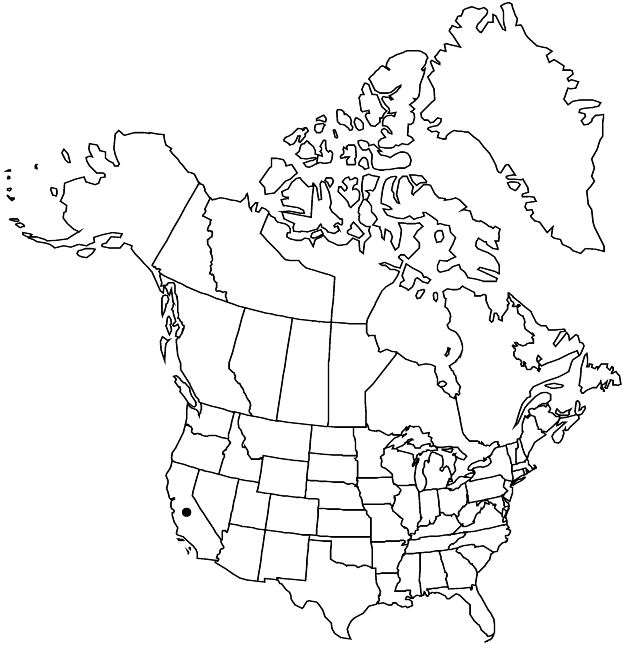Difference between revisions of "Malacothamnus jonesii"
Leafl. W. Bot. 6: 135. 1951.
FNA>Volume Importer |
FNA>Volume Importer |
||
| Line 19: | Line 19: | ||
|name=Malacothamnus gracilis | |name=Malacothamnus gracilis | ||
|authority=(Eastwood) Kearney | |authority=(Eastwood) Kearney | ||
| − | }}{{Treatment/ID/Synonym | + | }} {{Treatment/ID/Synonym |
|name=M. niveus | |name=M. niveus | ||
|authority=(Eastwood) Kearney | |authority=(Eastwood) Kearney | ||
| − | }}{{Treatment/ID/Synonym | + | }} {{Treatment/ID/Synonym |
|name=Malvastrum fremontii var. niveum | |name=Malvastrum fremontii var. niveum | ||
|authority=(Eastwood) McMinn | |authority=(Eastwood) McMinn | ||
| − | }}{{Treatment/ID/Synonym | + | }} {{Treatment/ID/Synonym |
|name=M. gracile | |name=M. gracile | ||
|authority=Eastwood | |authority=Eastwood | ||
| − | }}{{Treatment/ID/Synonym | + | }} {{Treatment/ID/Synonym |
|name=M. niveum | |name=M. niveum | ||
|authority=Eastwood | |authority=Eastwood | ||
| Line 46: | Line 46: | ||
|elevation=200–900 m | |elevation=200–900 m | ||
|distribution=Calif. | |distribution=Calif. | ||
| − | |discussion=<p>Malacothamnus jonesii is known from the central Coast Ranges.</p> | + | |discussion=<p><i>Malacothamnus jonesii</i> is known from the central Coast Ranges.</p> |
|tables= | |tables= | ||
|references= | |references= | ||
| Line 70: | Line 70: | ||
|publication year=1951 | |publication year=1951 | ||
|special status=Endemic | |special status=Endemic | ||
| − | |source xml=https://jpend@bitbucket.org/aafc-mbb/fna-data-curation.git/src/ | + | |source xml=https://jpend@bitbucket.org/aafc-mbb/fna-data-curation.git/src/8f726806613d60c220dc4493de13607dd3150896/coarse_grained_fna_xml/V6/V6_516.xml |
|subfamily=Malvaceae subfam. Malvoideae | |subfamily=Malvaceae subfam. Malvoideae | ||
|genus=Malacothamnus | |genus=Malacothamnus | ||
Revision as of 18:48, 18 September 2019
Shrubs, 1–2.5 m, branches slender, flexuous, indument white, usually velvety, not shaggy, stellate hairs stalked, sometimes sublepidote, ca. 10–30-armed, glandular hairs often abundant. Leaf blades ash green, ovate, ± rhombic, or suborbiculate, unlobed or 3- or 5-lobed, 2.5–4.5(–7) cm, thin to thick, surfaces: soft tomentose-white, adaxial pale ash green, white-velvety, basal sinus open, not overlapping. Inflorescences open-paniculate or subracemose, flower clusters pedunculate, loose, 3(–6)-flowered, or solitary flowers; involucellar bractlets awl-shaped to filiform, 2.5–7(–8) × 1 mm, 1/3–1/2(–2/3) calyx length. Flowers: calyx campanulate, not angled in bud, 5–9(–10) mm, lobes distinct in bud, narrowly triangular or deltate-lanceolate, 3–6(–7.5) × 1.5–3(–4) mm, length 2 times width, equaling to 3 times tube length, apex acute to short-acuminate, usually sublepidote to tomentose, hairs 10–30-armed, sometimes densely lanate; petals pale pink, to 1 cm. Mericarps 2.5–3.8 mm. 2n = 34.
Phenology: Flowering late Apr–Jun.
Habitat: Open chaparral, foothill woodlands
Elevation: 200–900 m
Discussion
Malacothamnus jonesii is known from the central Coast Ranges.
Selected References
None.
